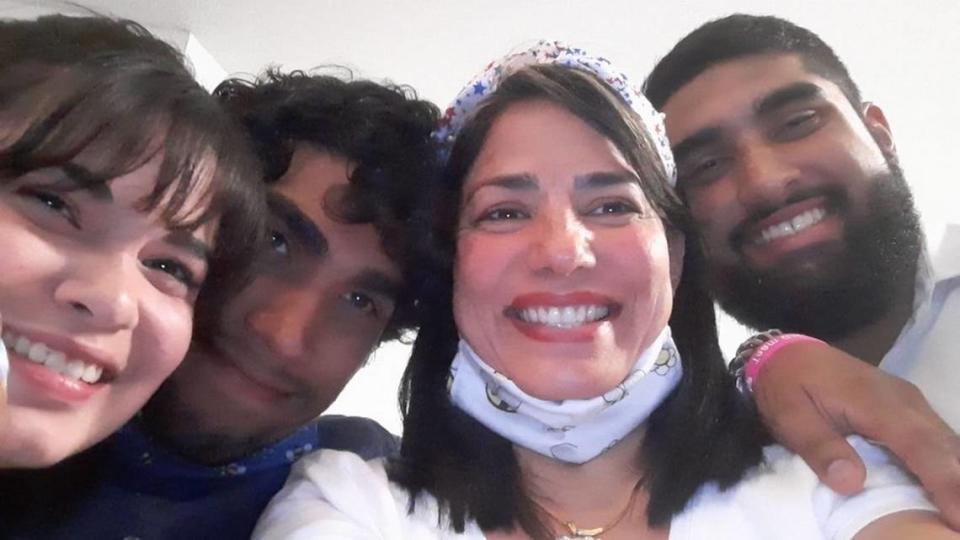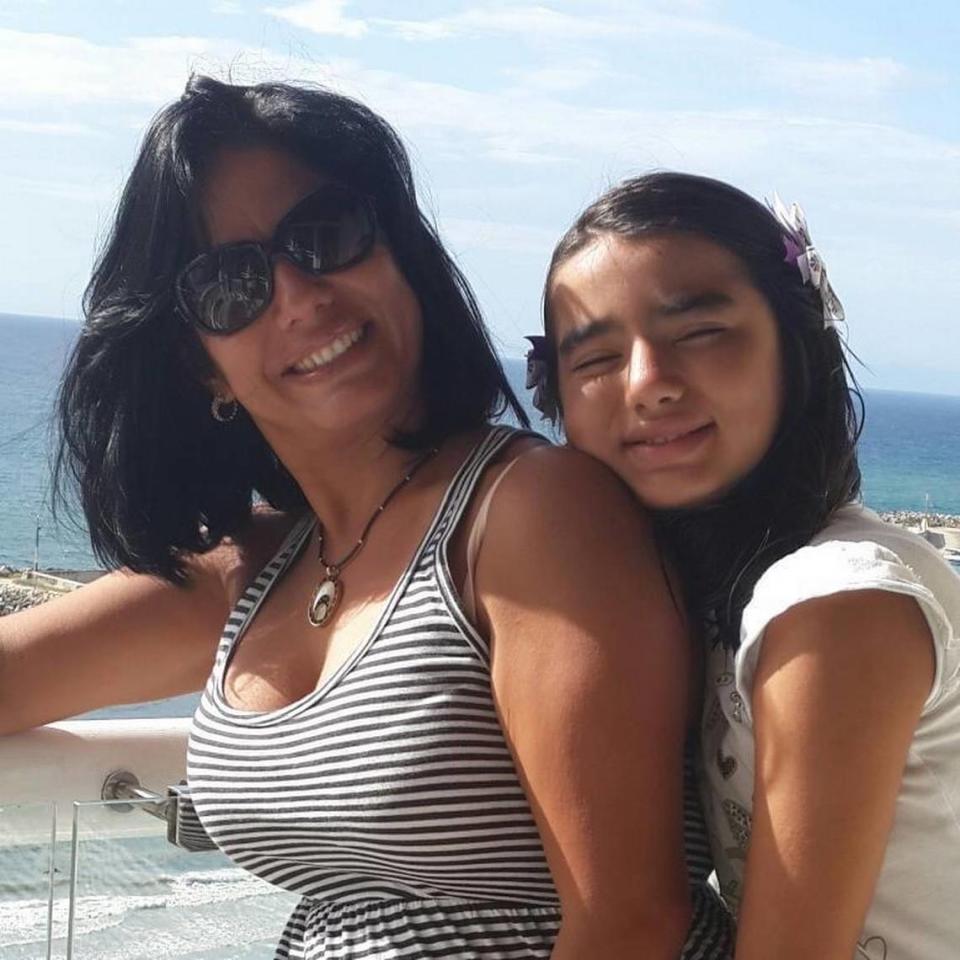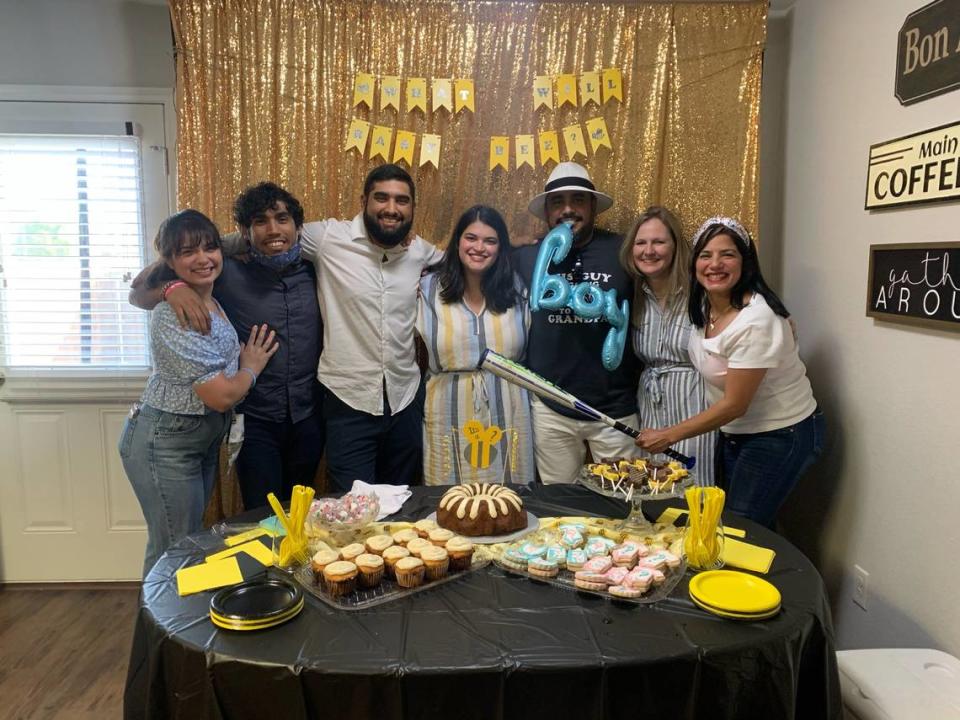Venezuelan immigrant who chased ‘American dream’ died in Fort Worth pileup, family says
Tamara Mendoza moved to North Texas about one year ago, after the respected dentist from Venezuela decided she could make more money for her 18-year-old daughter with working-class American jobs. Every day, from the early morning into the late night, she performed a range of tasks from cleaning bathrooms to serving food in a college cafeteria. She sent paychecks to her daughter an ocean away.
There were moments when Tamara, 46, became frustrated, unable to use the skills she acquired in college and graduate school in her home country, due to circumstances like her still-improving English and a global pandemic. But she also found a home in an unfamiliar place.
Much of the last year Mendoza lived in DeSoto with her second cousin, Esteban Vilchez, and his wife, Pamela Ly Anglero, the couple told the Star-Telegram. She was often gone — her position with a staffing company meant she filled in for absent workers at institutions across the region, including TCU. She developed friendships with some of those she worked with, Esteban said, because she made an effort to bring people close to her. She “didn’t allow herself to stop working, learning and living.”

In recent weeks, Tamara was residing with an elderly friend she had met on the job who needed her help. There would be days when Esteban wouldn’t hear from her because of her busy work schedule, he said, but she would always get around to texting or calling him or his father, Marco Vilchez, her first cousin in Carrollton.
Marco called her early on Feb. 11 to tell her she shouldn’t drive into work that morning, with ice accumulating on roads. She didn’t pick up, which didn’t immediately strike him as odd. She was likely at work, he thought.
Then he called again, and again, and again through the day, as all over the news he was seeing reports of a roughly mile-long pileup of vehicles on I-35W in Fort Worth. No answer.
When he hadn’t heard back from Mendoza by the evening, he called his son, who also hadn’t spoken with her all day. He saw her WhatsApp account hadn’t been active since 6 that morning. Worries turned into fear.
Esteban dialed a police information line to see if one of the cars in the wreck was his Hyundai Elantra, which he had lent to her days earlier. They confirmed the car was involved in the crash, he said, but told him he would have to call hospitals in order to find Tamara.
“We called every hospital,” Esteban said. “Nobody found her. She wasn’t there.”
He called the Tarrant County Medical Examiner’s Office first thing the next morning, as police had instructed him to do. The person on the phone told him there was one female body recovered from the crash, but it wasn’t her, Esteban said. He can remember thinking, “She has to be somewhere.”
He and Pamela called hospitals, police stations and even jails in a cycle throughout that day, holding onto the hope she had simply been misplaced or misidentified somewhere in the confused aftermath of the tragedy involving over 100 vehicles and more than 60 injured civilians.
That feeling dissipated in the afternoon when they learned through a contact with the medical examiner’s office there was a woman there who matched Tamara’s description. She had apparently gotten out of her car, Esteban said, and was run over by several oncoming vehicles. It took longer for them to get a positive identity, through fingerprints, he said.
By the next morning, Feb. 13, Tamara’s family knew for certain, along with the rest of the public: She was killed in the crash, the sixth victim to be identified in one of the worst tragedies in Fort Worth history. The medical examiner reported she died at 6:13 a.m. on Feb. 11 of multiple blunt force injuries.
It appears, based on medical examiner records, she was the only victim from outside of the U.S.
‘She came here to pursue the American dream’
Immigrants leaving developing countries typically come to America not because it will ensure a better life, but because it might bring them the chance to provide for their families, Marco described during a Zoom call this week. His cousin, whom he grew up with in Venezuela, knew this when she acquired her work visa, he said. She accepted the challenges.
At the same time, he said, she reconnected with family, and formed new relationships, in a little over a year’s time.
Marco said her life should serve as a lesson for any immigrant in a similar situation to, “Get together. Make a call. Say how much you appreciate them.”
“I feel that’s the biggest message that my cousin brings to this whole situation,” he said.
A GoFundMe page, which has so far raised more than $13,000 for funeral expenses, is filled with loving messages from loved ones, friends and strangers who heard Mendoza’s story, or saw that she worked at TCU. Many are in Spanish.
Back in Venezuela, news of her passing resulted in tributes on social media from some of the nation’s top dental groups, like the board of directors of dentists at her former grad school, Zulia University. The Ambassador of the Venezuelan Embassy also shared news of her death, in part because she led the national ministry of dentistry about a decade ago.
Her daughter, Marielena D’Freites, has been in their home in Maracaibo, a city in northwest Venezuela, trying to process the crash that happened more than 2,000 miles away.
She had been planning to come to America in the coming months, to see her mother and to pursue a modelling career in New York City. Tamara spoke with her over the phone usually at least once a day, until the accident. Marco called her on Feb. 13 to say Tamara had died.

D’Freites responded in Spanish to questions from the Star-Telegram, and Marco translated her answers into English.
“I give thanks to God for Tamara Mendoza as my mom,” D’Freites wrote from Venezuela. “To my eyes, she was simply perfect and she always will be.”
Her mother, she said, was a dreamer and a warrior who never liked to sit still, motivated by a desire for knowledge. She had an easy time making friends because of her openhearted personality that was like a light, rooted in a belief that all people were equal regardless of “social status, color of skin or religion,” D’Freites said.
She adored little reminders of love — a handwritten letter, a kiss, a hug. She would talk about the importance of enjoying life.
For “incomprehensible reasons,” Tamara’s life was taken at the young age of 46, her daughter said.
“My mom was always an angel and now will continue to be an angel,” D’Freites said.
Tamara’s family in Venezuela and her cousins in America don’t know what happened in the moments before she died, or what sort of actions may have prevented it. They have questions about how the roads were allowed to become coated in ice, and Marco said he’s open to legal action. He intends to speak up about the need for political leaders to enact meaningful changes.
He’s first concerned about properly honoring her life. She didn’t want to be cremated, so the family is trying to figure out the best way to preserve her body and have a funeral in Texas. It would likely be too hard to transport the body back to Venezuela, Marco said.
She will be buried in the country where she tried to forge a better future for her family, and where her daughter still intends to move sometime soon.
Tamara’s life, Marco said, should serve as a reminder of the tragedy that happened on Feb. 11.
“This doctor, this laureate came to America because not even being a PhD in Venezuela is better than cleaning toilets in the United States,” Marco said. “She came here to pursue the American dream, and died.”
A girl with a ‘personal goal’
Marco and Tamara were always more like brother and sister, a feature of being a part of a large and interconnected matriarchal family, with their grandmother at the top. Tamara, an only child, and Marco, one of five, would often live in the same home.
His mother would bring their family over to Tamara’s mother’s place most Fridays to stay with her, since she only had one child and was raising her as a single parent. They were brought up in a barrio in Maracaibo, a cluster of lower-income dwellings packed together, Marco remembers. They would run out into their yard, in the shadow of an apartment complex, to play games. Tamara loved to sing like her favorite Venezuelan singer, Kiara.
The importance of hard work, however, was stressed on all of the 13 grandchildren in the family, including Marco, who went to school to work in Venezuela’s vast oil industry. Tamara decided she would be a dentist, the profession of her father, Luis Mendoza, who was still a part of her life.
“That was the underlying goal,” Marco said. “Her personal goal.”
She gave birth to her daughter when she was a teenager and married the man she would years later divorce. Her new motherhood didn’t get in the way of her career goals — she went through about a decade of higher education, getting a PhD, before she launched her own practice for cosmetic dentistry.
It represented the realization of a lifelong dream, until, around 2013, Venezuelan businesses started failing due to an economic crisis following the death of President Hugo Chavez.
Tamara was able to establish dual citizenship in Mexico, where she could work as a dentist and send money home, Esteban said. That, too, soon wasn’t enough, and it seemed to her any work in America would be more prosperous, though she hoped she could eventually work again as a dentist.
“Even the small kind of work that was here — you’d make more money doing that than practicing medicine in these third world countries,” Esteban said. “She worked hard.”
She came to America for the first time about four years ago to work for a six-month stretch in Florida, where Marco and Esteban were living at the time. Marco brought Esteban to America when he was 3, so he knew of Tamara but had never met her before. The first thing he noticed was her palpable joy — the way she could make everyone in a room laugh, and smile through hard work.

When she went with Marco and Esteban to Disney World, she found herself dazzled by all the colorful characters and larger-than-life attractions, particularly loving the fireworks that lit up the night. She snapped pictures with her camera throughout the trip, a regular habit of hers.
“She just found the joy in everything she did,” Esteban said. “No matter how mundane it was, she found the joy in the experience.”
She made the decision to permanently move to America in 2019, coming to Marco and Esteban’s new home of North Texas. Esteban and his wife had rented a two-bedroom house, so they let Tamara stay in one of their rooms.
Though she worked all day, and would sometimes even stay with friends if they were closer to her job the next morning, she became close with Pamela and Esteban through dinners, and conversations, and quiet moments around the home.
One of the last times Esteban spoke with her, she was in her room, crying on the bed. It was a rare moment where she let her frustrations get the best of her, discouraged about the work she was doing, and longing to return to the field she picked as a child.
Esteban told her to have faith in God, and that she was put on Earth for a reason. He told her a story from the Bible about Joseph, who was put through trials of suffering, but did it all for his brothers and his family, Esteban said.
She was a lot like Joseph, he said. The one whose needs came last.
“She only thought of her family first, and then herself second,” Esteban said. “That’s the kind of person we’re talking about here.”
‘There are consequences that need to happen’
It’s painful to think about, but Tamara’s family wants to know what happened on the morning of Feb. 11 in the narrow and icy express lanes of I-35W.
Cellphone videos and firsthand accounts captured the seconds of the crash that felt like hours, as a continuous line of cars, pickup trucks and 18-wheelers careened into each other, unable to stop. Vehicles slid from left to right, turning sideways, their taillights flashing red. One man described seeing a woman be overrun by cars, though it’s unclear who the woman was.
Pamela and Esteban have inspected photos of the wrecked car from the impound lot, and compared them to a clip of the pileup from a reporter. They believe Tamara was in the front of the crash when the accident began, before it turned into a chain-reaction catastrophe.
Esteban said he would like to hear from whoever may have been involved with, or seen, the collision, understanding it may have been unavoidable but wanting clarity.
“I don’t blame anyone, but I think that there is blame that needs to happen,” Esteban said. “There are consequences that need to happen, whatever they may be. I’ll wait on that.”
He and his father feel they have a responsibility to be the ones pushing for the answers their family longs for, as the only two family members in the same country and same state where the crash occurred. Marco told the Star-Telegram he’s pursuing legal channels to “make sure this sacrifice doesn’t get swept under the rug.”
His cousin came to America because of the promise that it was “the best country in the world,” Marco said.
He believes something like this shouldn’t happen here.
“You cannot control human error when they’re driving,” Marco said. “But you can guarantee that there’s the best situation possible in the roads.”

